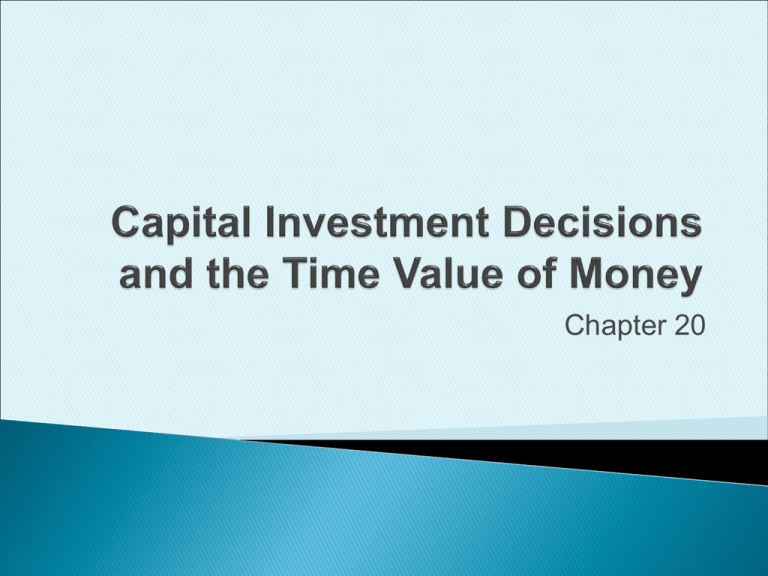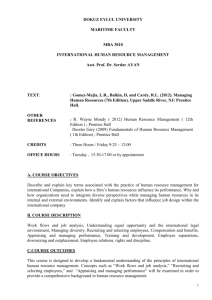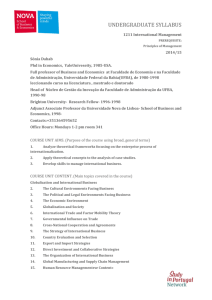
Chapter 20
Describe the importance of capital investments
and the capital budgeting process
Making capital investment decisions
Affects operations for many years
Requires large sums of money
Copyright (c) 2009 Prentice Hall. All rights reserved.
3
Payback
period
Accounting
rate of
return
Net present
value
Internal rate
of return
Copyright (c) 2009 Prentice Hall. All rights reserved.
4
Operating income differs from cash flows
Cash inflows
Cash outflows
Copyright (c) 2009 Prentice Hall. All rights reserved.
5
Identify
potential
investments
Project net
cash inflows
Project net
cash inflows
Post-audits
Capital
rationing
Analyze using
one or more of
the methods
Copyright (c) 2009 Prentice Hall. All rights reserved.
6
Use the payback and accounting rate of return
methods to make capital investment decisions
Length of time it takes to recover the cost of the
capital outlay
Measures how quickly the amount invested will be
recovered
The shorter the payback period, the more
attractive the asset
Copyright (c) 2009 Prentice Hall. All rights reserved.
8
Equal annual net cash inflows
Amount invested
?
Expected annual net cash inflow
Unequal annual net cash inflows
Total net cash inflows until
amount equals investment
Copyright (c) 2009 Prentice Hall. All rights reserved.
9
Focuses only on time, not profitability
Ignores cash flows after the payback period
Copyright (c) 2009 Prentice Hall. All rights reserved.
10
DECISION
RULE:
Payback Period
?
Copyright (c) 2009 Prentice Hall. All rights reserved.
11
Amount invested
Payback
period
Expected annual net cash inflow
$1,300,000
? years
$314,000
Copyright (c) 2009 Prentice Hall. All rights reserved.
12
Average annual operating income from asset
Average amount invested in asset
Original investment + Residual value
2
Copyright (c) 2009 Prentice Hall. All rights reserved.
13
DECISION RULE: Invest in capital assets?
If expected accounting rate
of return exceeds the
required
rate of return?
If expected accounting rate
of return is less than required
rate of return?
?
?
Copyright (c) 2009 Prentice Hall. All rights reserved.
14
Use the time value of money to compute the present
and future values of single lump sums and annuities
Invested money earns income over time
Copyright (c) 2009 Prentice Hall. All rights reserved.
16
Principal (p) – amount of the investment
Number of periods (n)
Interest rate (i) – annual percentage
Copyright (c) 2009 Prentice Hall. All rights reserved.
17
Time
Present value
Future value
Present value
Future value
Present value
Interest
earned
Future value
Interest
earned
Copyright (c) 2009 Prentice Hall. All rights reserved.
18
Mathematical formulas developed to compute
present and future values
These factors are programmed into business
calculators and spreadsheet programs
Copyright (c) 2009 Prentice Hall. All rights reserved.
19
Lump sum
Annuity
Copyright (c) 2009 Prentice Hall. All rights reserved.
20
Use discounted cash flow models to make capital
investment decisions
Recognize time value of money
Two methods:
◦ Net present value (NPV)
◦ Internal rate of return (IRR)
Compare amount of investment with its expected net
cash inflows
Companies use present value to make the
comparison
Copyright (c) 2009 Prentice Hall. All rights reserved.
22
Present value of net cash inflows
Less: Investment cost
Equals: Net present value
Interest rate used is
desired rate of return
The higher the risk,
the ? the rate
Copyright (c) 2009 Prentice Hall. All rights reserved.
23
DECISION RULE: Invest in capital assets?
If NPV is positive
If NPV is negative
?
?
Copyright (c) 2009 Prentice Hall. All rights reserved.
24
If investment is expected to bring in even cash
flows:
◦ Use Present Value of Annuity (PVA) table
If amounts are unequal:
◦ Present value of each individual cash flow is computed
◦ Use Present Value of $1 (PV) table
Copyright (c) 2009 Prentice Hall. All rights reserved.
25
Project A
Present value of net cash inflows
57,000 x 4.639 (PVA 14%, 8 periods)
$ 264,423
Investment cost
Net present value
(290,000)
(?)
Copyright (c) 2009 Prentice Hall. All rights reserved.
26
Project B
Present value of net cash inflows
77,000 x 5.328 (PVA 12%, 9 periods)
$410,256
Investment cost
Net present value
(380,000)
?
Copyright (c) 2009 Prentice Hall. All rights reserved.
27
Number of dollars returned for every dollar
invested
Present value of net cash inflows
Investment
Copyright (c) 2009 Prentice Hall. All rights reserved.
28
Rate of return a company can expect to earn by
investing in the project
The interest rate that will cause the present value
to equal zero
Investment’s cost
Present value of net cash flows
Copyright (c) 2009 Prentice Hall. All rights reserved.
29
Investment’s cost
PVA
Factor
Annual net cash inflow
Copyright (c) 2009 Prentice Hall. All rights reserved.
30
DECISION RULE: Invest in capital assets?
If the IRR exceeds the
required rate of return?
If the IRR is less than
required rate of return?
?
?
Copyright (c) 2009 Prentice Hall. All rights reserved.
31
Methods that Ignore the Time Value of Money
Payback Period
Accounting rate of return
Simple to compute
Uses accrual accounting
Focuses on time it takes to
recover cost of asset
Shows how investment will impact
operating income, which is
important to investors
Ignores cash flows after the
payback period
Highlights risks of assets with
longer cash recovery periods
Measures the profitability over the
asset’s life
Ignores time value of money
Ignores time value of money
Copyright (c) 2009 Prentice Hall. All rights reserved.
32
Methods that Incorporate the Time Value of Money
Net present value
Uses time value of money and
asset’s cash flows over its entire
life
Indicates whether the asset will
earn the minimum required rate of
return
Shows excess or deficiency of
asset’s present value of net cash
flows over its initial cost
Internal rate of return
Uses time value of money and
asset’s cash flows over its entire
life
Computes the project’s unique
rate of return
Profitability index should be
computed when assets have
differing investment amounts
No additional steps needed for
capital rationing decisions
33







